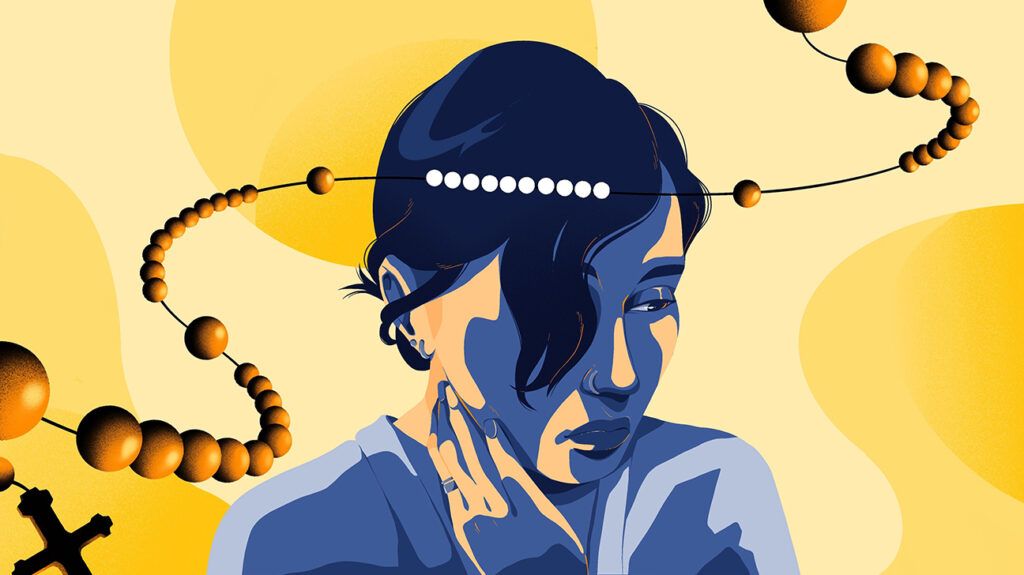
There are a lot of habits I’ve kept from my Catholic upbringing: I cross myself when I feel uncertain, I commemorate most Catholic holidays, and I keep my rosary in a special place.
Unfortunately, my religious upbringing has also had a few negative effects on me. Let’s just say that jokes about Catholic guilt ring incredibly true for me.
I first realized this when I blamed myself for an accident I’d had — just a simple fall. I felt like it was my fault because I hadn’t prayed for my own safety.
From then on, I’d often feel the need to pray for safety — an urge that started feeling eerily similar to my compulsions.
As I began therapy, I started noticing how I used a lot of religious beliefs — beliefs I thought I no longer held. I did this to justify some of the cognitive distortions that fueled my OCD.
Obsessive-compulsive disorder (OCD) is often accompanied by cognitive distortions — in other words, errors in the way you think that make you see things as more negative than they are.
These distortions can form the basis of the “OCD logic” that guides our obsessions and compulsions.
Although these thoughts are irrational and illogical, they can affect us deeply.
Common OCD cognitive distortions could include:
- All-or-nothing thinking. Also known as black-and-white thinking. [It’s] the idea that you’re either entirely good or entirely bad and that small mistakes will make you a bad person.
- Catastrophizing. Assuming the very worst will happen.
- Discounting the positive. Ignoring the good and often exaggerating the bad.
- Emotional reasoning. Assuming your feelings are evidence of reality (for example, if you feel lonely, it must be because nobody loves you).
- Inflation of responsibility. Also known as hyper-responsibility. [It’s] the idea that you’re responsible for more than what you’re actually responsible for, including the feelings and experiences of others, and that you’re to blame if anything goes wrong.
- Intolerance of uncertainty. The belief that you can and must know what will happen in order to feel comfortable.
- Magical thinking. The idea that your thoughts determine reality.
- Over-importance of thoughts. Also known as thought-action fusion. [It’s] the idea that thinking about doing something is the moral equivalent of doing it.
- Perfectionism. The idea that you need to be flawless in order to be worthy.
Certainly, many people use cognitive distortions, not just those with OCD.
However, when you have OCD, addressing those distortions can be an important part of therapy.
Sometimes, “reality checking” — which includes noticing that these thoughts are irrational and not based on evidence — can be hugely helpful.
For example, I’m prone to magical thinking and placing too much importance on my thoughts.
Because of this, I often think that I accidentally manifest horrible events, from natural disasters to abuse and death.
I’ve learned to identify this “magical thinking” when it shows up, which helps me nip it in the bud before my thoughts spiral.
When I learned to recognize some of the cognitive distortions I use, I was struck by how much religious thinking was involved. I often justified my irrational thoughts with these beliefs.
Despite the fact that I hadn’t gone to church in years, the lessons I’d learned from religious leaders left a profound impression on me.
Cognitive distortions aren’t exclusive to religious people, and not all religious people are prone to using cognitive distortions. However, some religious teachings can worsen these distorted thoughts.
In particular, I’ve always struggled with hyper-responsibility.
I often thought that, if something bad happened to a loved one, it was because I didn’t pray hard enough for their safety.
Although I don’t pray anymore, I still tend to will protection over those I love, and I feel like it’s my duty. I blame myself when my loved ones are in a crisis, for example.
Similarly, I engage in a lot of magical thinking and thought-action fusion distortions.
For instance, I worry that I can manifest my anxious thoughts into being. This stems in part from believing in prayer at a young age, but it’s been worsened by learning about the law of attraction.
There are some other ways religious beliefs can fuse with cognitive distortions when you have OCD.
Here are some more examples that I’ve noticed in myself:
- All-or-nothing thinking. “You’re either bad, which means you’re going to hell, or good, which means you’re going to heaven.”
- Emotional reasoning. “If you feel bad about something, that’s God telling you not to do it.”
- Overimportance of thoughts. “God can see my thoughts, so if I’m thinking about doing something bad, it’s just as bad as if I actually did it.”
I used many religious teachings to justify the logic of my obsessions and compulsions. This prevented me from seeking help when my OCD symptoms first started showing up.
What this meant was that I lived with the pain of untreated OCD for longer than necessary.
It’s hard to talk about the relationship between religion and OCD without talking about scrupulosity.
OCD can have various “themes” — in other words, it can show up in a few different ways.
One OCD theme is scrupulosity, also known as religious or moral OCD.
With scrupulosity, people develop excessive fears about doing things that go against their religions or personal ethics.
Not every religious person with OCD will have scrupulosity, but some do.
This can show up in a few different ways. For example, someone might feel the need to follow religious law to the letter; if they suspect they’ve made a mistake, they might catastrophize and assume they’re going to hell.
With religious OCD, compulsions could include excessive praying, seeking reassurance from religious leaders, and engaging in other spiritual activities, like fasting, to “make up” for your perceived sins.
I want to make it clear that I’m not saying religion causes OCD.
Someone who has moral OCD will probably have symptoms of another kind even if they’re not religious.
Similarly, I believe I would’ve still had OCD even if it weren’t for my Catholic upbringing. Plenty of nonreligious people have OCD, too.
If you have OCD, though, or if you live with mental health symptoms, you may notice that cognitive distortions often tend to cloud your perception. In turn, you might notice that your brain uses religious teachings to justify your cognitive distortions and fuel your disorder.
Recognizing these distortions doesn’t make you a bad person, or bad in the eyes of God.
Many people might fear that questioning these distortions entails questioning God or their religious beliefs, but this isn’t true at all.
Getting OCD treatment doesn’t mean you have to give up your religion, either.
However, a therapist — and perhaps a religious leader — can help you engage with your religion in a healthier way.
In fact, you might find that OCD treatment makes your religious practices enjoyable and fulfilling (instead of exhausting and anxiety-inducing).
I’m living proof that it’s possible to learn to manage your OCD symptoms and recognize those cognitive distortions, even after a lifetime of believing them.
It took me a while to find a good therapist, but when I found someone I connected with, it worked.
I was surprised at how much progress I’d made within the first few months of therapy.
Although therapy certainly isn’t easy, it’s paid off surprisingly fast.
Journaling has also helped me recognize those cognitive distortions and do a “reality check” so that I can stop myself from spiraling.
I don’t believe religion is, in itself, bad for one’s mental health, but I do believe many of us need to work through our “religious baggage” in order to heal.
The good news is that healing is possible — and you don’t need to give up on your religious beliefs in order to work toward it.



